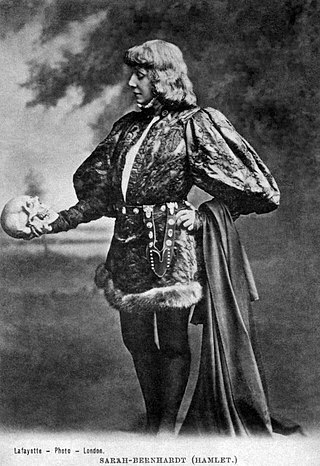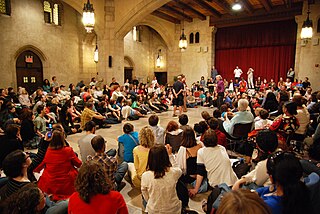
Acting is an activity in which a story is told by means of its enactment by an actor who adopts a character—in theatre, television, film, radio, or any other medium that makes use of the mimetic mode.

Sir Tom Stoppard is a Czech-born British playwright and screenwriter. He has written for film, radio, stage, and television, finding prominence with plays. His work covers the themes of human rights, censorship, and political freedom, often delving into the deeper philosophical thematics of society. Stoppard has been a playwright of the National Theatre and is one of the most internationally performed dramatists of his generation. He was knighted for his contribution to theatre by Queen Elizabeth II in 1997.

Augusto Boal was a Brazilian theatre practitioner, drama theorist, and political activist. He was the founder of Theatre of the Oppressed, a theatrical form originally used in radical left popular education movements. Boal served one term as a Vereador in Rio de Janeiro from 1993 to 1997, where he developed legislative theatre.

Jerzy Marian Grotowski was a Polish theatre director and theorist whose innovative approaches to acting, training and theatrical production have significantly influenced theatre today. He is considered one of the most influential theatre practitioners of the 20th century as well as one of the founders of experimental theatre.

An experiment is a procedure carried out to support or refute a hypothesis, or determine the efficacy or likelihood of something previously untried. Experiments provide insight into cause-and-effect by demonstrating what outcome occurs when a particular factor is manipulated. Experiments vary greatly in goal and scale but always rely on repeatable procedure and logical analysis of the results. There also exist natural experimental studies.

In fiction, a character is a person or other being in a narrative. The character may be entirely fictional or based on a real-life person, in which case the distinction of a "fictional" versus "real" character may be made. Derived from the Ancient Greek word χαρακτήρ, the English word dates from the Restoration, although it became widely used after its appearance in Tom Jones by Henry Fielding in 1749. From this, the sense of "a part played by an actor" developed. A character, particularly when enacted by an actor in the theater or cinema, involves "the illusion of being a human person". In literature, characters guide readers through their stories, helping them to understand plots and ponder themes. Since the end of the 18th century, the phrase "in character" has been used to describe an effective impersonation by an actor. Since the 19th century, the art of creating characters, as practiced by actors or writers, has been called characterization.

Acrobatics is the performance of human feats of balance, agility, and motor coordination. Acrobatic skills are used in performing arts, sporting events, and martial arts. Extensive use of acrobatic skills are most often performed in acro dance, circus, gymnastics, and freerunning and to a lesser extent in other athletic activities including ballet, slacklining and diving. Although acrobatics is most commonly associated with human body performance, the term is used to describe other types of performance, such as aerobatics.
John Webster was an English Jacobean dramatist best known for his tragedies The White Devil and The Duchess of Malfi, which are often seen as masterpieces of the early 17th-century English stage. His life and career overlapped with Shakespeare's.

Noh is a major form of classical Japanese dance-drama that has been performed since the 14th century. It is the oldest major theater art that is still regularly performed today. Noh is often based on tales from traditional literature featuring a supernatural being transformed into a human hero who narrates the story. Noh integrates masks, costumes and various props in a dance-based performance, requiring highly trained actors and musicians. Emotions are primarily conveyed by stylized conventional gestures while the iconic masks represent specific roles such as ghosts, women, deities, and demons. Having a strong emphasis on tradition rather than innovation, Noh is highly codified and regulated by the iemoto system.

Lee Strasberg was an American theatre director, actor and acting teacher. He co-founded, with theatre directors Harold Clurman and Cheryl Crawford, the Group Theatre in 1931, which was hailed as "America's first true theatrical collective". In 1951, he became director of the nonprofit Actors Studio in New York City, considered "the nation's most prestigious acting school," and, in 1966, he was involved in the creation of Actors Studio West in Los Angeles.
The Theatre of Cruelty is a form of theatre conceptualised by Antonin Artaud. Artaud, who was briefly a member of the surrealist movement, outlined his theories in a series of essays and letters, which were collected as The Theatre and Its Double. The Theatre of Cruelty can be seen as a break from traditional Western theatre and a means by which artists assault the senses of the audience. Artaud's works have been highly influential on artists including Jean Genet, Jerzy Grotowski, Peter Brook, and Romeo Castellucci.
Slice of life is a depiction of mundane experiences in art and entertainment. In theater, slice of life refers to naturalism, while in literary parlance it is a narrative technique in which a seemingly arbitrary sequence of events in a character's life is presented, often lacking plot development, conflict, and exposition, as well as often having an open ending.
Sivarasa a/l K. Rasiah, or also known as R. Sivarasa is a Malaysian politician, lawyer and human rights activist of Ceylonese and Sri Lankan descent who served as the Deputy Minister of Rural Development in the Pakatan Harapan (PH) administration under former Prime Minister Mahathir Mohamad and former Minister Rina Harun from July 2018 to the collapse of the PH administration in February 2020 and the Member of Parliament (MP) for Sungai Buloh from May 2018 to November 2022 as well as for Subang from March 2008 to May 2018. He is a member and former Vice-President of the People's Justice Party (PKR), a component party of the PH coalition. He is co-founder of the Suara Rakyat Malaysia (SUARAM), a human rights non-governmental organisation (NGO).
Sombhu Mitra was an Indian film and stage actor, director, playwright, reciter and an Indian theatre personality, known especially for his involvement in Bengali theatre, where he is considered a pioneer. He remained associated with the Indian People's Theatre Association (IPTA) for a few years before founding the Bohurupee theatre group in Kolkata in 1948. He is most noted for films like Dharti Ke Lal (1946), Jagte Raho (1956), and his production of Rakta Karabi based on Rabindranath Tagore's play in 1954 and Chand Baniker Pala, his most noted play as a playwright.

The Theatre of the Oppressed (TO) describes theatrical forms that the Brazilian theatre practitioner Augusto Boal first elaborated in the 1970s, initially in Brazil and later in Europe. Boal was influenced by the work of the educator and theorist Paulo Freire and his book Pedagogy of the Oppressed. Boal's techniques use theatre as means of promoting social and political change in alignment originally with radical-left politics and later with centre-left ideology. In the Theatre of the Oppressed, the audience becomes active, such that as "spect-actors" they explore, show, analyse and transform the reality in which they are living.

Sudhindra Sircar, also known as Badal Sarkar, was an influential Indian dramatist and theatre director, most known for his anti-establishment plays during the Naxalite movement in the 1970s and taking theatre out of the proscenium and into public arena, when he transformed his own theatre company, Shatabdi as a third theatre group. He wrote more than fifty plays of which Ebong Indrajit, Basi Khabar, and Saari Raat are well known literary pieces. A pioneering figure in street theatre as well as in experimental and contemporary Bengali theatre with his egalitarian "Third Theatre", he prolifically wrote scripts for his Aanganmanch performances, and remains one of the most translated Indian playwrights. Though his early comedies were popular, it was his angst-ridden Evam Indrajit that became a landmark play in Indian theatre. Today, his rise as a prominent playwright in 1960s is seen as the coming of age of Modern Indian playwriting in Bengali, just as Vijay Tendulkar did it in Marathi, Mohan Rakesh in Hindi, and Girish Karnad in Kannada.

Theatre or theater is a collaborative form of performing art that uses live performers, usually actors or actresses, to present experiences of a real or imagined event before a live audience in a specific place, often a stage. The performers may communicate this experience to the audience through combinations of gesture, speech, song, music, and dance. It is the oldest form of drama, though live theatre has now been joined by modern recorded forms. Elements of art, such as painted scenery and stagecraft such as lighting are used to enhance the physicality, presence and immediacy of the experience. Places, normally buildings, where performances regularly take place are also called "theatres", as derived from the Ancient Greek θέατρον, itself from θεάομαι.

A play is a form of drama that primarily consists of dialogue between characters and is intended for theatrical performance rather than mere reading. The creator of a play is known as a playwright.

John Joseph Paul Studzinski, CBE is an American-British investment banker and philanthropist. Since September 2018 he has been Managing Director and Vice Chairman of the global investment-management firm PIMCO.

Balwant Thakur is an Indian theatre personality and scholar, known for bringing Dogri theatre to international notice. He was honoured by the Government of India, in 2013, by bestowing on him the Padma Shri, the fourth highest civilian award, for his contributions to the field of theatre.














